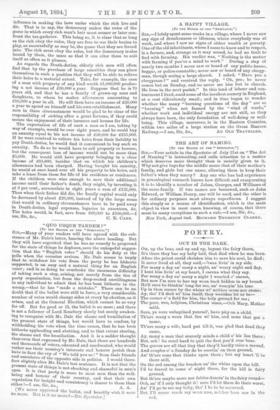"QUO USQUE TANDEM P"
[To THE EDITOR OF THE " SPECTATOR."]
Stn,—Many of your readers will have agreed with the sub- stance of Mr. Dale's letter, bearing the above heading. But they will have regretted that he has no remedy to propound for the state of things he deplores, save the unhopeful sugges- tion that the " English voter " should do his duty at the polls when the occasion arrives. Mr. Dale seems to imply that to withdraw his vote from the party he has hitherto supported, is an easy and a natural thing for an English voter ; and in so doing he overlooks the enormous difficulty of taking such a step, arising, not merely from the ties of party organisation, but from the deep-seated unwillingness in any individual to admit that he has been hitherto in the wrong,—that he has " made a mistake." There can be no doubt that if the ballot were still in force, a very considerable number of votes would change sides at every by-election, as it arises, and at the General Election, which cannot be so very far off. But for good or ill, the ballot is no more; and there is not a follower of Lord Rosebery slowly but surely awaken- ing to recognise with Mr. Dale the shame and humiliation of the present state of things, but would have to confess, by withholding his vote when the time comes, that he has been hitherto applauding and abetting, and to that extent sharing, the shame and the humiliation. And it is a sadder thought than even that expressed by Mr. Dale, that there are hundreds and thousands of voters, educated and uneducated, who would rather see their country's interests and honour perish than have to face the cry of " We told you so ! " from their friends and associates of the opposite side in politics. I would there- fore slightly alter Mr. Dale's last sentence. It is not that the present state of things is not shocking and shameful in men's eyes. It is that party is more to most men than the well- being and honour of their country, and that their own reputation for insight and consistency is dearer to them than either !—I am, Sir, &o., A. A. [We never approved the ballot, and heartily wish it were no more. But is it no more P—ED. Spectator.]


































 Previous page
Previous page